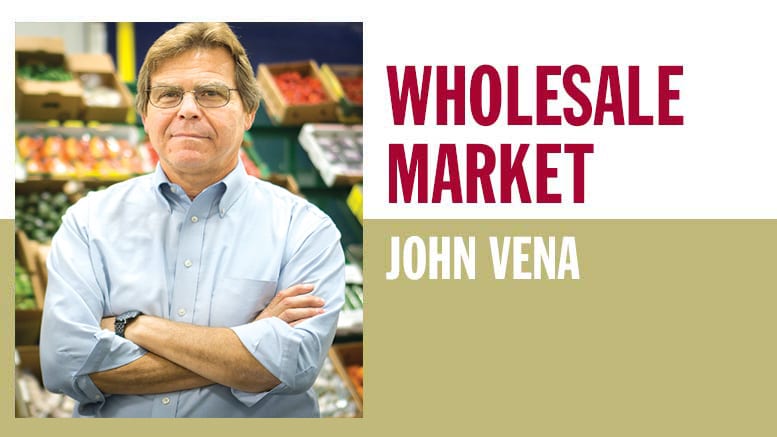Fruit Logistica: Earth-Friendly Packaging, Robots Fuel Trends
March 2, 2019 | 3 min to read
At Fruit Logistica in Berlin, the evolution of the produce industry was striking, showcasing produce from 90 countries to over 78,000 attendees. The emphasis on sustainable packaging has risen, with biodegradable and recyclable options becoming more prevalent, highlighting a shift away from traditional plastics. Innovations like robots for packing and enhanced greenhouse technology marked a significant advancement. However, challenges remain as convenience demands clash with environmental concerns, hinting at a complex journey towards a plastic-free future.

Originally printed in the March 2019 issue of Produce Business.
- Thirty-five acres of produce from 90 countries
- Seventy-eight thousand produce people
- A more mature and confident version of the sustainable packaging industry
- Robots!
 I have been regularly attending Fruit Logistica in Berlin, Germany since 2007. My first visit was an overwhelming immersion into the global produce industry. Attendance at that show was above 35,000. The attendees were industry people from all over the world. I walked every aisle of every hall gawking at the displays with my hands in my pockets like a kid in a candy shop without a dime to spend. So much fresh produce, so little of it allowed into the United States.
I have been regularly attending Fruit Logistica in Berlin, Germany since 2007. My first visit was an overwhelming immersion into the global produce industry. Attendance at that show was above 35,000. The attendees were industry people from all over the world. I walked every aisle of every hall gawking at the displays with my hands in my pockets like a kid in a candy shop without a dime to spend. So much fresh produce, so little of it allowed into the United States.
On my last visit, I did walk every hall but skipped many of the aisles. The footprint of the show has grown so large that there just isn’t time to see everything in the three days the show is open. Early appointments often include enough coffee to keep one moving. Later in the day, many exhibitors offer stronger beverages with which to fortify oneself.
The first few years I visited Fruit Logistica, I wandered the lower halls to look over packing lines, fresh-cut equipment, greenhouse technology, tractors and planting machines. It was not a large area, and the target market seemed to be European and Middle Eastern growers and processors. In recent years, my company has invested in its own packaging equipment, so I allocated several hours of this visit to browsing the weighing, packing and bagging machines.
Although tractors and tillers can still be purchased, there has been a marked increase in greenhouse technology and automation for the global market. And yes, they had robots. Some were picking and packing fruit and vegetables from conveyors, and some, of course, were capable of picking fruit and vegetables from plants and trees.
Technology of all kinds has grown in our industry, but packaging for consumer convenience has seen incredible growth. Of course, that isn’t news. But on this visit to Fruit Logistica, I found the conversation about packaging materials was tipping from traditional plastic to more sustainable selections.
Our industry will move toward ‘plastic-free,’ but it is unlikely we will arrive at ‘packaging-free’ without innovation, the application of new ideas and perhaps a change in consumer attitudes and habits.
There were plenty of conventional plastics offered. However, biodegradable, compostable and recyclable options were more apparent and from a wider range of manufacturers than in previous years. Europeans have been pushing away from environmentally dangerous materials, particularly in Italy, The Netherlands and the UK. Much has been written lately about reusable/refillable containers, ‘no-plastic’ grocery and ‘naked’ produce aisles in supermarkets. In fact, what seems to be happening is a return to the kinds of produce containers used in stores when I was younger. One of my earliest memories of pre-packed produce is Brussels sprouts in paper cups covered with a square of clear plastic film, secured with a rubber band. That technology is making a return. At Fruit Logistica, paper-based tills for berries, small fruits and vegetables were featured in many booths, but these were often top-sealed with a sustainable film.
This trip has given me a few new few buzzwords to add to my packaging vocabulary. I found words like ‘molded fiber,’ ‘bio-based’ and ‘home compostable’ embedded in the product descriptions of many of the materials.
However, with the exception of ‘home compostable,’ many of these terms don’t convey much meaning. Having read more on this subject, I find labeling a material ‘recyclable’ doesn’t mean it will ever be recycled. Not all communities have the facilities, and not everyone participates in these programs.
Unfortunately, the demands from retailers and consumers for pre-packed items and more convenience have created our current reality. It isn’t likely we will see a reversal of these trends. Our industry will move toward ‘plastic-free,’ but it is unlikely we will arrive at ‘packaging-free’ without innovation, the application of new ideas and perhaps a change in consumer attitudes and habits.
At Fruit Logistica, the shift from non-sustainable materials to more earth-friendly materials was evident. However, the battle lines in actual industry practice seem to be drawn between cost and conscience. Prepackaging of fresh produce is more of a manufacturing problem, and with such problems, investments are made and protected. My own company just installed a new bagging line. It is serving us well right now, but I am concerned we will not be able to run more environmentally friendly materials on it. Therefore, I look forward to Fruit Logistica 2020 and the suggestions and solutions it will offer.
John Vena is the owner of John Vena Inc., a family owned and operated produce business located in the Philadelphia Wholesale Produce Market. Founded in 1919, the company is a fourth generation family business bearing the name of John Vena’s grandfather.
9 of 9 article in Produce Business May 2019

